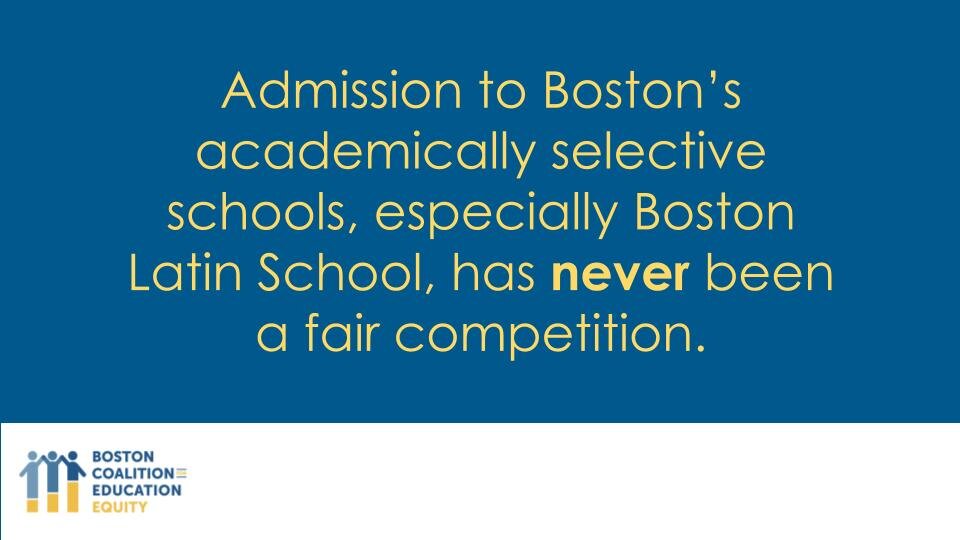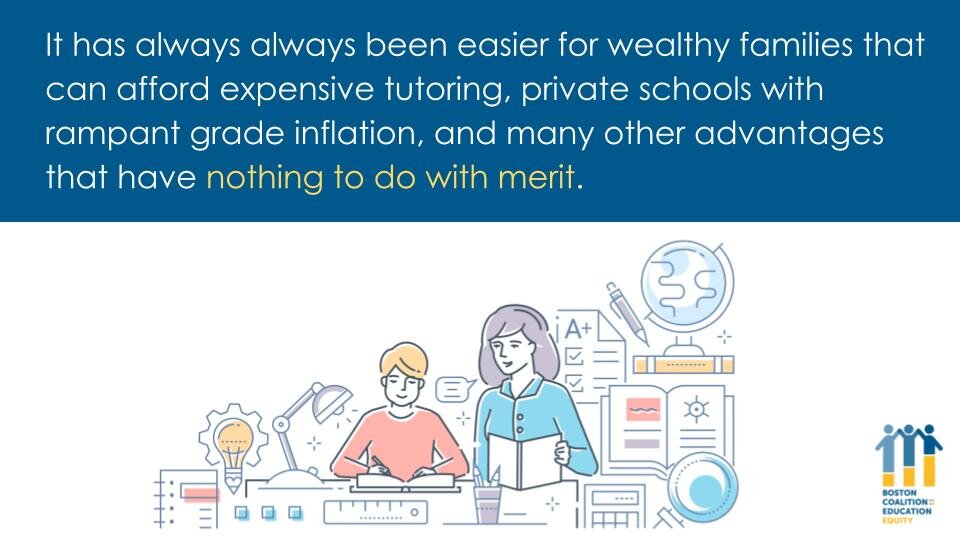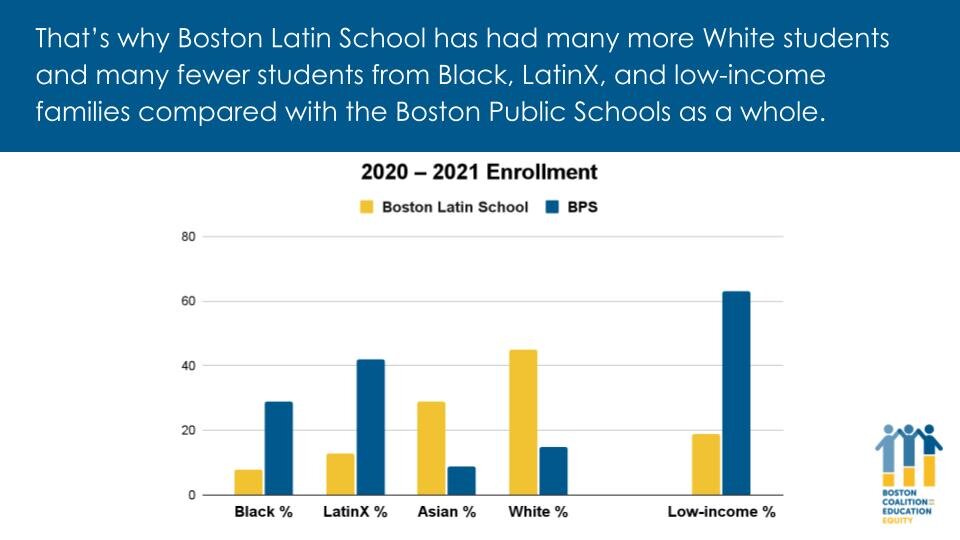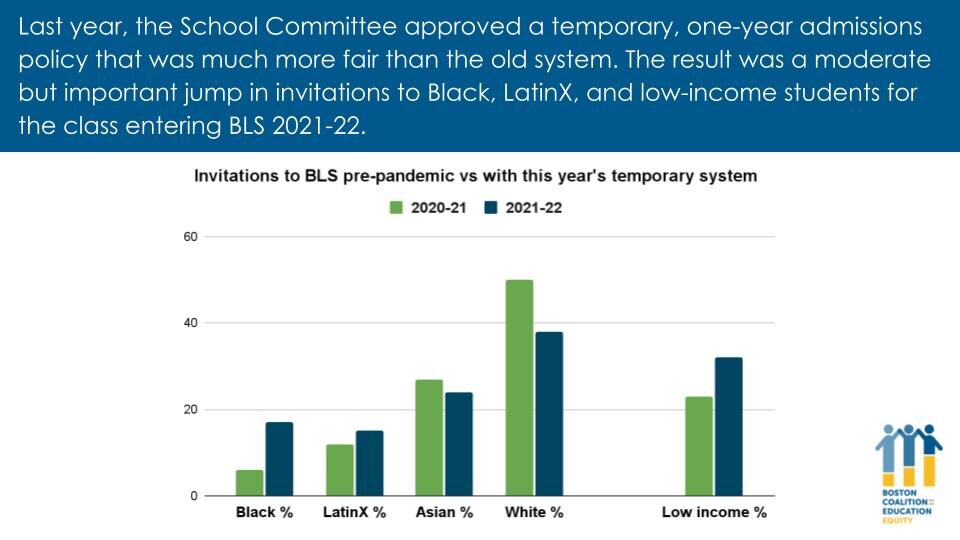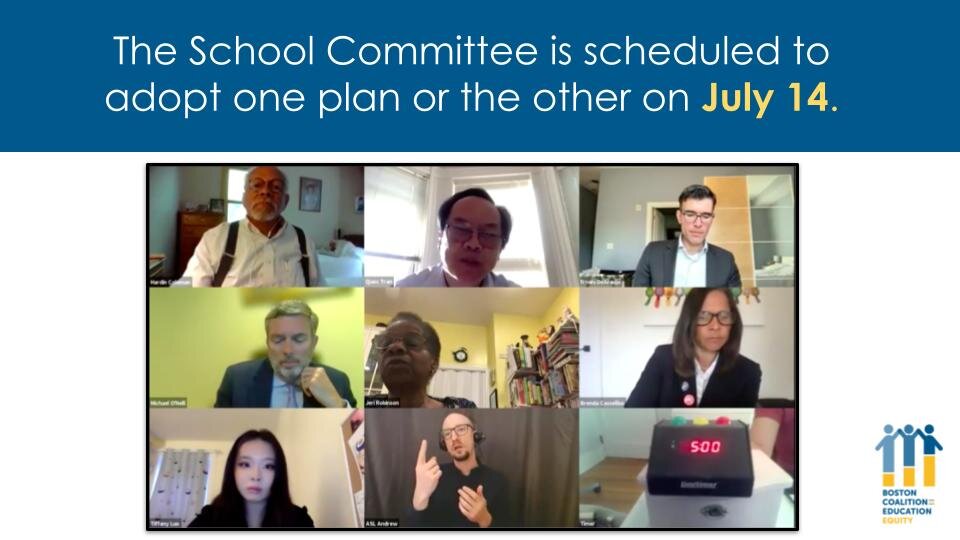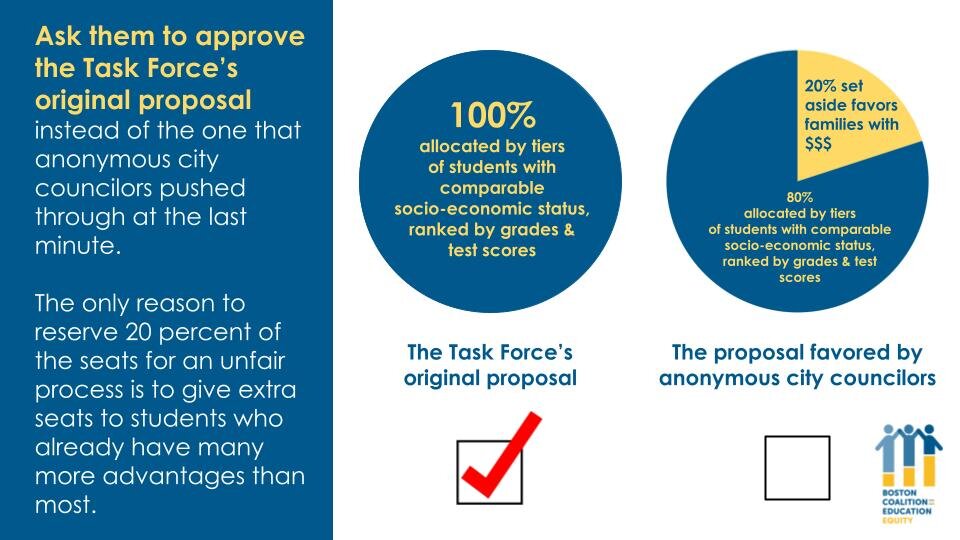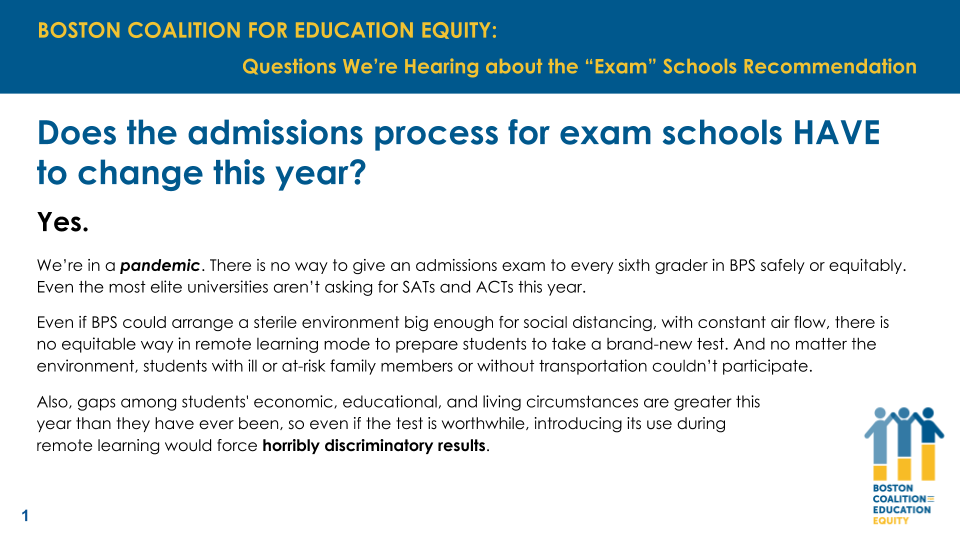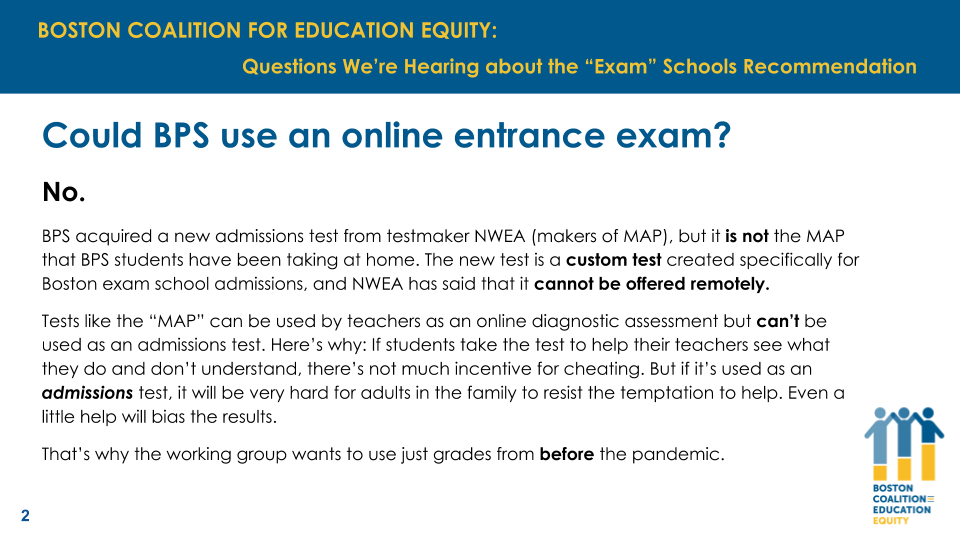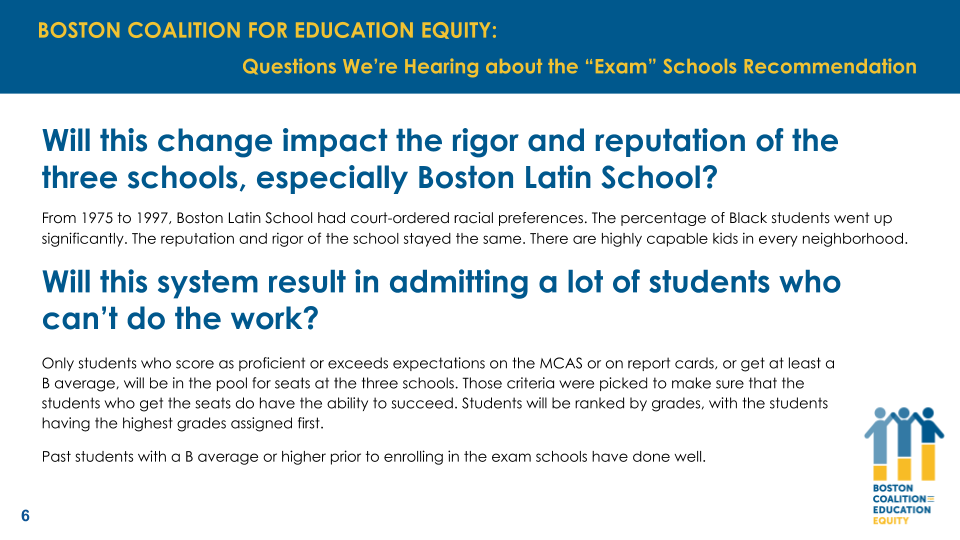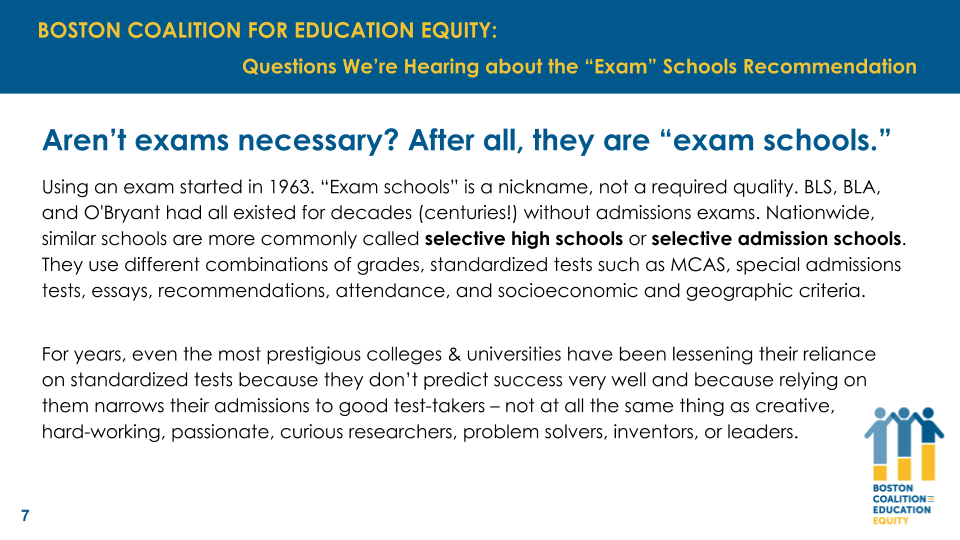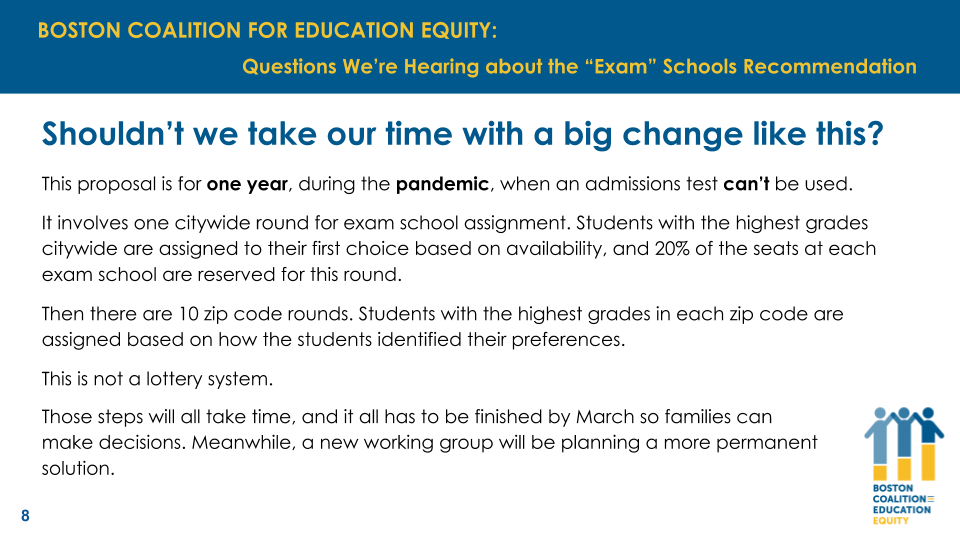The debate over changing admissions procedures at the three highly selective public schools has been a difficult and heart-wrenching conversation across our city for decades.
As leaders of civil rights, community and education advocacy organizations representing racially diverse students, families and educators, we stand united in efforts to bring greater socio-economic, neighborhood, cultural and racial equity and high quality educational opportunities to all students in Boston. We also stand united in our opposition to the lawsuit, Boston Parent Coalition for Academic Excellence v. Boston School Committee, filed on Friday February 26, 2021. The lawsuit is a short-sighted attempt and distraction which stalls much needed efforts to ensure all students have equitable access to quality public schools, especially during the COVID-19 pandemic.
The most important path to educational equity is to improve all public schools in the city, not just focus on admission into the three elite exam schools. All students deserve to feel like they have won the lottery, no matter what BPS school they attend.
All families, regardless of race, class, language or neighborhood want a quality education for their children. However, the inequity of resources and opportunities in Boston Public Schools (BPS) creates a scarcity mindset which leaves many families feeling that the exam schools are one of the only opportunities for a quality education. The impact of this sentiment is acutely felt by working class and low-income families who represent the largest percentage of children in the BPS; Asian American families, the demographic group that has the highest
percentage of its children staying within BPS; Black families who send their children outside of BPS at the highest rate in search of a quality education; and Latinx families who represent the largest racial/ethnic demographic group (42%) in BPS. The Boston Parent Coalition lawsuit preys upon this scarcity of opportunity in the most pernicious of ways: it pits white and Asian American families against Black and Latinx families, as though educational opportunity is a zero-sum game.
Historically, Boston’s Black, Asian American, and Latinx communities have formed alliances to fight for affordable housing, fair wages, voting access and educational equity. The vast majority of Boston’s Black, Asian American and Latinx communities are working class. The median household income for each of these groups is at least $40,000 less than that of white households.
As a diverse group of long time public education activists, organizations and community leaders committed to racial equity, we both acknowledge that there has been a historic lack of attention to and misunderstanding of the needs of Asian American students in the district and at the same time, Black and Latinx students have been historically underrepresented in Boston's exam schools among other challenges. We fully support the suspension of the entrance exam as a criterion for selection to attend the exam schools in favor of criteria that value high academic standards, increased neighborhood equity, socio-economic inclusion and racial diversity. This is possible to achieve.
The district’s temporary model for admissions to its exam schools is not perfect. Faced with no practicable means for administering an entrance exam, and significant doubts about the validity of grades during a pandemic, Boston Public Schools adopted an interim admissions policy for its three exam schools that relies on pre-pandemic grades. However, grading policies differ across school types, benefiting students from some schools over others. Future proposals should also consider a priority for public school students in Boston, so that those
who have spent K-6 in the public system are not disadvantaged in the application process by students who have spent time in elite private schools. We also need to be sensitive to access for low-income families who reside in neighborhoods with higher median family income, whether it is public housing or otherwise, as seen in neighborhoods like Chinatown, South End and Brighton.
But, most importantly, we need to improve educational opportunities for every student, in every Boston Public School. Until we do that, the exam school controversy is a diversion.
That said, we will not allow our communities to be pitted against each other; rather, we are committed to working in unity to ensure all students, particularly Black, Latinx, Asian American, low-income and working class families, who have been systematically denied opportunities, have more equitable access to fully-resourced and highly desirable schools.
We are resolute in our conviction to continue our work together, with shared accountability, to help ensure the children of Boston receive a world class education.
//
American Civil Liberties Union of Massachusetts (ACLU)
Anti-Defamation League, New England Region (ADL)
Asian American Resource Workshop (AARW)
Asian Community Development Corporation (ACDC)
Black Boston COVID-19 Coalition (BBCC)
Boston Coalition for Education Equity (BCEE)
Boston Network for Black Student Achievement (BNBSA)
Citizens for Public Schools (CPS)
Greater Boston Latino Network (GBLN)
Greater Boston Legal Services’ Asian Outreach Unit
Greater Malden Asian American Community Coalition
Lawyers for Civil Rights (LCR)
Massachusetts Asian American Educators Association (MAAEA) Massachusetts Advocates for Children (MAC)
Massachusetts Black Lawyers Association
Mijente Boston Asamblea
NAACP Boston Branch
The Talented and Gifted Association, Inc.
Vietnamese American Initiative for Development (VietAID)
West Roxbury/Roslindale Progressives
Rev. Willie Bodrick, Senior Pastor 12th Baptist Church*
Karen Chen, Chinese Progressive Association*
Cheryl Clyburn Crawford, BBCC, NAACP Boston*
Matt Cregor, Mental Health Legal Advisors Committee*
Thang Diep, VietAID*
Stephanie Everett, Esq., BPS Parent
State Representative Russell Holmes, MA 6th Suffolk District Suzanne Lee, retired principal
Pamela A. Leins, BPS/MMA student caretaker, BLS Alumna
Katie Li, BPS educator, MAAEA
Mark Liu, BPS parent
Jose Lopez, past President of the Massachusetts Association of Hispanic Attorneys*
Lydia Lowe, Chinese Progressive Political Action*
Veronica Navarro, BPS educator and Democratic State Committee member* Sung-Joon Pai, BPS parent, MAAEA, Progressive Education Network * Kim Parker, Black Educators Alliance of Massachusetts (BEAM)* Go Sasaki, BPS educator, MAAEA
Andrea So, BPS educator, MAAEA
Ilyitch N. Tabora, BLS Parent, BLS Alumna, President of the Talented and Gifted Association, Inc.
Jessica Tang, MAAEA, MA Asian Pacific American Labor Alliance, and Boston Teachers Union*
Rosann Tung, parent of BPS graduate, MAAEA
*organization affiliation listed for identification purposes
Media Contacts:
Tanisha M. Sullivan, NAACP Boston Branch- 617-433-7409
Ivan Espinoza-Madrigal, Lawyers for Civil Rights- 617-988-0624
Jessica Tang, MAAEA - 617-650-0632
Thang Diep, VietAID - 617-701-6028

